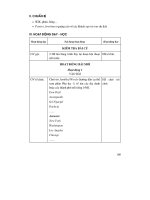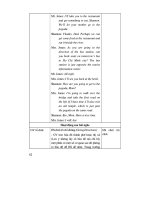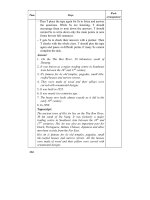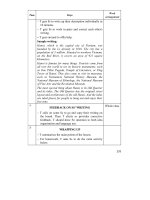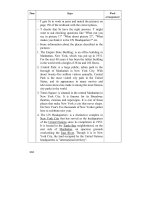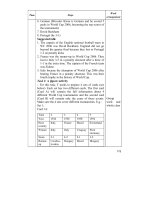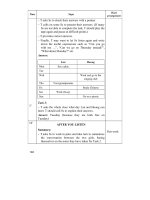thiet ke bai giang tieng anh 10 tap 10047 2761
Bạn đang xem bản rút gọn của tài liệu. Xem và tải ngay bản đầy đủ của tài liệu tại đây (288.96 KB, 10 trang )
/a:/: first pronounce the sound /a:/ then put your
tongue down and back.
/a:/ is a long sound.
5’
Practice 1
Play the tape and ask them to repeat.
Pair work
Call on some Ss to repeat the sounds clearly to in
front of the class.
Ask Ss to work in pairs and practice the sentences.
Introduce peer correction.
Go around the class and provide help if necessary.
Grammar and vocabulary
7’
Presentation and Practice 2
Pair work
Keep Ss in pairs and ask them to make questions for
the responses.
Note: This is an easy activity so it can be carried out
in a short time. There will be various acceptable
questions.
Call on some pairs to read the questions and
responses aloud in front of the class.
Give suggested answers:
1. When did you come back from Ho Chi Minh
City?
2. How long did you stay there?
3. Who did you come with?
4. Where did you live?
5. Why do you learn English?
6. What time is it?
7. How many children have they got?
47
10’
Presentation 3
Distinguish the infinitive and -ing form
The base form of a verb often functions as an
infinitive. It is called the bare infinitive because it is
used without to. We must distinguish it from the toinfinitive, where to is always used in front of the
base form of the verb. The -ing form of a verb
sometimes functions as a gerund (a kind of noun)
and sometimes as a present participle. Many verbs
and adjectives, and some nouns, can be followed by
one of these forms, and in some cases by more than
one form. From the student’s point of view, the
problem is knowing which form is appropriate. This
may be because only one form is grammatically
correct, e.g: enjoy doing or fail to do. Or it may be
because only one form suits what we want to say,
e.g: remember to do or remember doing.
The following list are the verbs which can only
followed by to-infinitive and -ing:
The verbs can only be followed by to-infinitive:
agree
refuse
manage
fail
decide
plan
hope
expect
seem
tend
48
Whole class
The verbs can only be followed by -ing form:
enjoy
avoid
mind
consider
practice
miss
postpone
risk
The to-infinitive and -ing never mean the same when
we use after these verbs: remember, forget, try, and
stop.
Remember + to-infinitive refers to an action in the
future (or to a “future” action as seen from the past.):
Remember to post the letters. (= don’t forget to)
I remembered to post the letters. (= I didn’t forget to)
Remember + -ing refers to the past:
I remember posing the letters.
(= I posted them and I remember the action)
Forget + to-infinitive refers to future actions (or to a
future action as seen from the past):
Don’t forget to ask Tom. I forgot to ask Tom.
Forget + -ing refers to the past:
Have you forgotten meeting her?
Regret + to-infinitive refers to future or present:
We regret to inform you that you failed in the exam.
Regret + -ing refers to present or past:
I regret buying so many newspapers.
Try + to-infinitive means “make an effort”:
You should try to get high marks in the final exam.
Trying + -ing means “experiment”:
49
Try learning French and you will find it interesting.
Stop + to-infinitive refers to a purpose
On the way to school, I stopped to buy a newspaper.
Stop + -ing: -ing is the object of the verb:
We couldn’t stop laughing because of his funny story.
7’
Practice 3
Ask Ss to read the letter carefully and fill in each
blank with an -ing and to-infinitive form of the verb
in brackets.
Tell Ss to compare their answers with a friend.
Call on some Ss to read the completed letter.
Make necessary corrections.
Give correct answers:
Dear Lisa,
I expected (1) to hear from you. I hope you are OK.
I’m busy but happy.
Last night I went to a party at one of my classmates’
home. I was really nervous. You know how I usually
avoid (2) going to parties because I have trouble (3)
remembering people’s names. Well, last night things
were different. Before the party, I read a book about
improving your memory, I practice (4) doing some of
the memory exercises. They really helped. As a
result, I stopped (5) worrying about what people
would think of me, and I tried (6) to pay attention to
what people were saying. And guess what? I had a
good time! I’m even planning (7) to go dancing with
this guy from my class.
Why don’t you consider (8) visiting me? I really miss
(9) seeing you. Please write. I always enjoy (10)
hearing from you.
Best wishes,
Sonia
50
Individual
work
Practice 4
6’
Further practice with –ing and to-infinitive form.
Pair work
Ask Ss to work in pairs and complete the sentences
using an –ing or to-infinitive form of the verbs in the
box.
Call on some Ss to read their answers aloud in front
of the class.
Feedback and give correct answers:
1. It was a nice day, so we decided to go for a
walk.
2. I’m not in a hurry. I don’t mind waiting.
3. They were hungry, so she suggested having
dinner early.
4. I’m still looking for a job, but I hope to find
something soon.
5. We must do something. We can’t go on living
like this.
6. Could you please stop making so much
noise?
7. Our neighbour threatened to call the police if
we didn’t stop the noise.
8. Lan was in a difficult situation, so I agreed to
lend her some money.
9. Suddenly everybody stopped talking.
10. Don’t forget to post the letter I gave you.
51
Unit 3
People’s background
Period 1
(Reading)
I. Aim
Reading for general ideas and specific information
II. Objectives
By the end of the lesson, Ss will be able to:
-
read better through Matching and True or False exercises.
-
improve background knowledge about famous scientists especially
about Marie Curie.
III. Materials
Textbook, whiteboard markers,…
Pictures of some famous scientists,…
IV. Anticipated problems
Ss may lack of information about Marie Curie.
V. Procedure
Time
10’
Steps
Warm-up
Networks
Have Ss work in groups of 3 to 4.
Ask them to make a list of famous scientists.
After 5 minutes, the group with the longest list will be
the winner.
52
Work
arrangement
Group work
Famous scientists
Note: Ss may give the wrong spellings of some
scientists. Accept them and make necessary
corrections.
Ask further questions about some scientists regarding
their specialisations and achievements.
7’
Before you read
Ask Ss to work in pairs and answer the following
questions:
Have you ever heard of Marie Curie?
Pair work
and Whole
class
What do you know about her?
Set the scene
Marie Curie is the world famous scientist. She made
great contributions to the world’s science. Today, we
will learn about her life and her research. Firstly,
let’s have a quick look at some new words and
phrases that you will come across in the passage.
Vocabulary pre-teach
general education (n): comprehensive study of all
subjects and skills (giáo dục phổ thông)
brilliant (a): clever, quick at learning (thông minh,
sáng dạ)
mature (a): fully-grown/developed in character and
power (trưởng thành)
harbour the dream of: foster/keep in mind the dream of
doing smt (nuôi ước mơ trở thành…)
53
flying colours: (leave university) with excellent grade
(tốt nghiệp đại học loại ưu)
PhD: Doctor of Phylosophy (Tiến sĩ)
tragic death: die painfully, tragically (cái chết đau
khổ)
to be awarded: to be presented with (được trao cái gì)
atomic weight of radium: (translation) (trọng lượng
nguyên tử)
humanitarian wish: (translation) (mong muốn nhân
đạo)
While you read
7’
Task 1 - Matching
Ask Ss to read the passage individually and match the
words or phrases in A with their meanings in B.
Individual
work
Tell Ss to refer to Vocabulary pre-teach for help and
encourage them to try to guess the meanings of the
words in the context of the reading.
Call on some Ss to read and explain their answers
aloud in front of the class.
Feedback and give correct answers:
7’
1. c
2. e
4. d
5. b
3. a
Task 2 - True or False
Have Ss read the passage more carefully and decide
whether the statements are true (T) or false (F).
Correct the false information.
Ask Ss to highlight or underline the information in the
passage that helps Ss find the correct answers.
Call on some Ss to explain their answers. It’s up to Ss’
level, T may ask further questions such as:
Why is it true / false?
54
Individual
work
Can you give me the information in the passage?
Feedback and give correct answers:
1. T
2. F (Her dream was to become a scientist.)
3. T
4. F (She married Pierre Curie in 1895.)
5. T
Task 3 - Answering Questions
7’
Ask Ss to do the task in pairs to answer the questions.
Pair work
Tell Ss to compare their answers with other pairs. Let
them discuss and correct for one another.
Feedback and give correct answers:
1. Marie Curie was born in Warsaw on November
7, 1867.
2. She was a brilliant and mature student.
3. She worked as a private tutor to save money
for a study tour abroad.
4. She was awarded a Nobel Prize in Chemistry
for determining the atomic weight of radium.
5. No, it wasn’t. Her real joy was “easing human
suffering.”
5’
After you read
Make sure Ss understand all the adjectives in the
book.
Group work
Further explain if necessary
Instruct the task:
Above are five adjectives we may use to describe
Marie Curie. Find the evidence from the passage to
prove each of them.
Ask Ss to work in groups and highlight or underline
the evidence that they find in the passage.
55
Give suggested answers:
strong-willed (She haboured the dream of scientific
career, which was impossible for a woman at that
time.)
ambitious (In spite of her difficult situation, she
worked extremely hard and earned a degree in
Physics with flying colours. )
hard-working (She works extremely hard.)
intelligent (As a brilliant student,…)
humane (She had a humanitarian wish that ease
human suffering.)
3’
Wrapping
Summarise the main points.
Whole class
Assign homework.
Supplements
Further reading about Marie Curie
Marie Curie, a Polish-born French chemist
Birth
November 7, 1867
Death
July 4, 1934
Place of
Birth
Principal
Residence
Warsaw, Poland
Paris, France
Pioneering the study of radioactivity and discovering the radioactive
elements radium and polonium
Known for
Winning the 1903 Nobel Prize in physics with her husband, Pierre
Curie, and Antoine Henri Becquerel
Winning the 1911 Nobel Prize in chemistry, and becoming the first
scientist to receive the award in two different scientific categories
56



